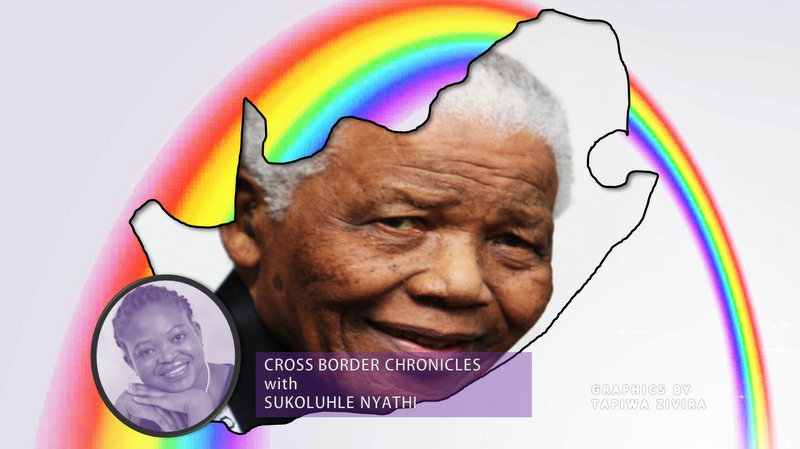
THE whole world has been on tenterhooks for the past three weeks.
Cross-Border Chronicles with Sukoluhle Nyathi.
They have watched with bated breaths trying to ascertain the fate of the ailing Nelson Mandela.
Others have been holding vigil outside the hospital and praying for his recovery. I can only empathise with his family.
Anyone who’s ever had to sit by and watch a family member disintegrate through ill health for months on end knows exactly what I am talking about.
As much as you hate to think about it, you almost wish they could get a reprieve from their suffering.
Tata Madiba, as Mandela is fondly known, is a revolutionary and a politician who was born at the end of the World War I. What is poignant is that he is battling for his life on the eve of his 95th birthday.
He has almost lived a century even though 27 years of that life was spent in prison in Robben Island and later Pallsmoor Prison. What is sad about Mandela’s story is that post his release and ascension to the Presidency of South Africa, he lobbied for reconciliation as opposed to retribution.
- Chamisa under fire over US$120K donation
- Mavhunga puts DeMbare into Chibuku quarterfinals
- Pension funds bet on Cabora Bassa oilfields
- Councils defy govt fire tender directive
Keep Reading
Nelson’s story could be a parable from the Bible. It embodies all the qualities that humans aspire for, but never quite attain. It is for this very reason that he is revered the world over. He really fathered the South African polity, trying to embrace people of every race, colour or creed in what has now come to be known as the “rainbow nation”.
A rainbow, as you know, is a spectrum of colours that normally appears after a storm which I believe for South Africa was apartheid. However, rainbows by nature are transient.
Having lived in South Africa, I believe that the rainbow nation is a fleeting (experimental) concept.
I last witnessed it during the 2010 Fifa World Cup. During that time I felt everyone looked past their racial exteriors and the rainbow nation emerged. However, for the most part, South Africa remains racially divided. The spatial development framework alone will never quite eradicate the legacy of apartheid.
I remember vividly working on a project in Kwazulu-Natal where I was publicly maligned by this Afrikaner man. What angered me was that none of the black men rallied to my defence. If anything, they cowered to this white man. I cried that day, not for myself because I could walk away from the situation.
I cried for those men who would be subjugated to that kind of treatment day after day.
In all my naïvety and innocence, I did not know what racism was until my 10th birthday. I went to a multiracial school and even though I was probably one of the handful of black kids there, I was never made to feel different.
In the 1980s, before advent of Dark ’n Lovely, my mother would secure my afro in two pony tails. Still I felt no different.
We all played together on the playground and we were truly the blueprint of perfect rainbow children.
They all had birthday parties and we all traipsed along.
Then I had mine and instead of all 20 kids from my class showing up, only seven did.
Then it dawned on me that we might all be equal in God’s eyes, but we obviously were not so equal in my 10-year-old eyes.
This is when the cracks in my picture-perfect life started to appear.
Needless to say, I never had another birthday party after that. By the time I was in high school I was wise to the ways of the world.
There were blacks and there were whites. Then there were blacks who tried to behave like whites to “fit in”. They were the “good” blacks. The narrative hasn’t changed. Even America which serves as the blueprint for democracy — having elected a President of colour — has racial tension and inequalities.
However, they have come a long way since Django Unchained and I think if we don’t judge too harshly, so have we.
We now date across colour lines. It’s not uncommon to see interracial marriages and interracial offspring.
Racism will always exist like sexism and all other forms of prejudice.
I don’t believe it can be totally eradicated from society. I don’t believe we’ll ever achieve complete racial integration. However, the desire to achieve it is a noble one and one we should continue to strive for it.
Not all white people are racist. There are “good” whites too. So, although it might feel like we are chasing rainbows at times, I truly believe Mandela had noble intentions.
Apartheid institutionalised racism and left a damaging legacy on the South African landscape.
Mandela fought for freedom from this, but his overriding desire was for peace and unity.
We are not perfect, but we should strive towards it.
He is truly inspirational and I hope his desire for unification across colour and creed will live on long after he’s gone.
l Sukoluhle Nyathi is the author of the novel The Polygamist










